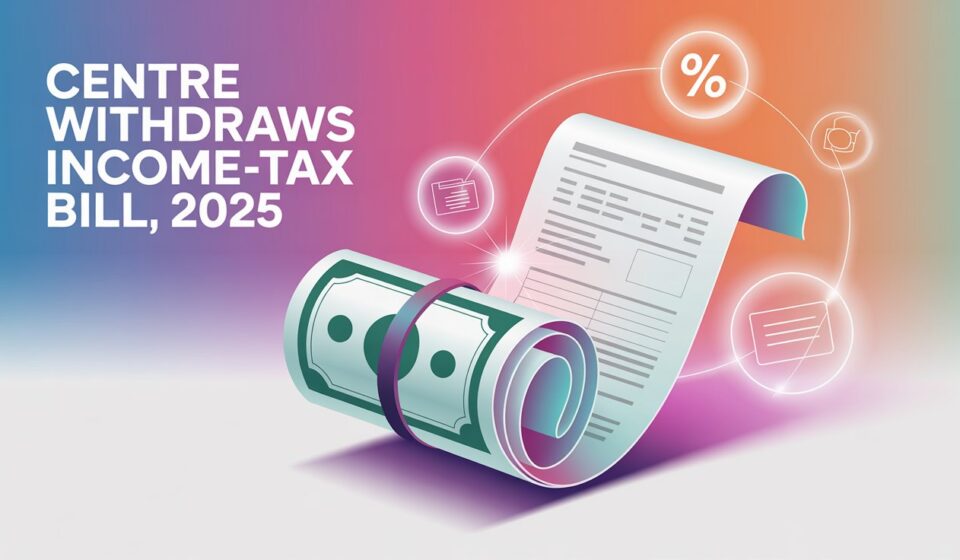
Center withdraws Income-Tax Bill, 2025 – what it means, who’s affected, what comes next
The Center has withdrawn the Income-Tax Bill, 2025 to incorporate Select Committee recommendations and fix drafting issues. Read a concise, clause-level explainer, who is affected and what to watch next.
Table Of Content
Quick summary
The Union Government has formally withdrawn the Income-Tax Bill, 2025 and said it will reintroduce a revised text in Parliament. The withdrawal is a procedural move to incorporate Select Committee recommendations and correct drafting ambiguities flagged during scrutiny. The withdrawal does not change existing law — the Income-tax Act, 1961 remains in force — but it delays any immediate shift to the new statutory framework and gives stakeholders a single, corrected bill to debate.
The lead: why the government pulled the plug
Officials described the step as necessary after the Select Committee and parliamentary reviewers identified substantive drafting issues and ambiguities in key areas — notably provisions touching salaries and exemptions, house-property rules, corporate tax clauses and charitable-trust regulations. Rather than proceed with a text that could create uncertainty or litigation risk, the government opted to withdraw and reintroduce a consolidated, corrected bill so Parliament can debate a single, final draft.
Background in brief
- What was the Bill: A comprehensive rewrite of the Income-tax Act intended to modernize language, streamline provisions and (according to the government) make compliance simpler.
- When first tabled: The Bill was earlier tabled in 2025 and referred to a Select Committee for review.
- Why the Select Committee matters: Committee review is standard for major statutory reforms; it produces recommendations that either tighten, amend or strike out proposals before a full parliamentary vote.
Key problem areas that pushed withdrawal
Readers and tax professionals pointed to several friction points that likely influenced the decision:
- Salary & deductions: Ambiguity over the scope of certain deductions and how salary components are to be classified.
- House-property rules: Confusing transitional language and valuation mechanics that could create double taxation or exemptions gap.
- Corporate tax & passthroughs: Drafting that could affect effective tax incidence for certain corporate structures.
- Trusts & charitable entities: Unclear compliance and registration rules that could harm bona fide trusts.
Fixing textual clarity and aligning rules with committee recommendations was presented as essential to avoid unintended consequences.
Immediate legal and market effect
- No change to taxpayers’ day-to-day obligations — the 1961 Act remains the operative law until Parliament enacts a replacement.
- Market signal: Withdrawal indicates the government is sensitive to stakeholder feedback and willing to rework major structural changes, which may calm short-term policy uncertainty but extends the timeline for reform.
- Compliance planning: Tax departments, advisors and corporates should continue operating under existing rules while tracking revisions closely.
Who should care most — impact snapshot
- Salaried taxpayers: Watch for clarity on standard deductions and definition of taxable salary components.
- Real-estate owners / house-property filers: Potential changes to how notional rents, interest deduction and capital receipts are treated.
- Corporates & tax teams: Possible rewording of corporate provisions that could affect effective tax rates or transfer pricing/anti-avoidance rules.
- Non-profits / trusts: Revisions could change registration, audit and application of exemptions.
- Tax professionals / compliance vendors: Need to update model returns, payroll engines and advisory notes once the revised text is tabled.
What to watch next (concrete dates & steps)
- Reintroduction of revised bill: Watch the revised text when tabled (the government has signalled an early reintroduction).
- Select Committee report: Compare the revised draft with committee recommendations to see which changes were accepted.
- Clause-by-clause scrutiny: Focus on wording in contentious sections — small textual changes can produce large compliance differences.
- Implementation timeline & rules: Look for transitional provisions, effective dates, and any grandfathering measures for ongoing assessments.
Expert view (short)
Tax lawyers welcome the move to avoid ambiguity; businesses see it as useful to remove compliance risk. Some critics say repeated rework delays much-needed modernization. Overall, withdrawal is a pause for precision rather than a policy reversal.
Concise takeaway
The withdrawal buys time to fix drafting problems and align the Bill with parliamentary recommendations. For now, nothing changes legally — taxpayers and businesses should continue following the Income-tax Act, 1961 while preparing for the revised draft.



